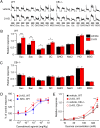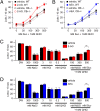Endocannabinoids selectively enhance sweet taste
- PMID: 20080779
- PMCID: PMC2818929
- DOI: 10.1073/pnas.0912048107
Endocannabinoids selectively enhance sweet taste
Abstract
Endocannabinoids such as anandamide [N-arachidonoylethanolamine (AEA)] and 2-arachidonoyl glycerol (2-AG) are known orexigenic mediators that act via CB(1) receptors in hypothalamus and limbic forebrain to induce appetite and stimulate food intake. Circulating endocannabinoid levels inversely correlate with plasma levels of leptin, an anorexigenic mediator that reduces food intake by acting on hypothalamic receptors. Recently, taste has been found to be a peripheral target of leptin. Leptin selectively suppresses sweet taste responses in wild-type mice but not in leptin receptor-deficient db/db mice. Here, we show that endocannabinoids oppose the action of leptin to act as enhancers of sweet taste. We found that administration of AEA or 2-AG increases gustatory nerve responses to sweeteners in a concentration-dependent manner without affecting responses to salty, sour, bitter, and umami compounds. The cannabinoids increase behavioral responses to sweet-bitter mixtures and electrophysiological responses of taste receptor cells to sweet compounds. Mice genetically lacking CB(1) receptors show no enhancement by endocannnabinoids of sweet taste responses at cellular, nerve, or behavioral levels. In addition, the effects of endocannabinoids on sweet taste responses of taste cells are diminished by AM251, a CB(1) receptor antagonist, but not by AM630, a CB(2) receptor antagonist. Immunohistochemistry shows that CB(1) receptors are expressed in type II taste cells that also express the T1r3 sweet taste receptor component. Taken together, these observations suggest that the taste organ is a peripheral target of endocannabinoids. Reciprocal regulation of peripheral sweet taste reception by endocannabinoids and leptin may contribute to their opposing actions on food intake and play an important role in regulating energy homeostasis.
Figures




References
-
- Williams CM, Kirkham TC. Anandamide induces overeating: Mediation by central cannabinoid (CB1) receptors. Psychopharmacology (Berl) 1999;143:315–317. - PubMed
-
- Higgs S, Williams CM, Kirkham TC. Cannabinoid influences on palatability: Microstructural analysis of sucrose drinking after delta(9)-tetrahydrocannabinol, anandamide, 2-arachidonoyl glycerol and SR141716. Psychopharmacology (Berl) 2003;165:370–377. - PubMed
Publication types
MeSH terms
Substances
Grants and funding
LinkOut - more resources
Full Text Sources
Other Literature Sources
Molecular Biology Databases
Miscellaneous

